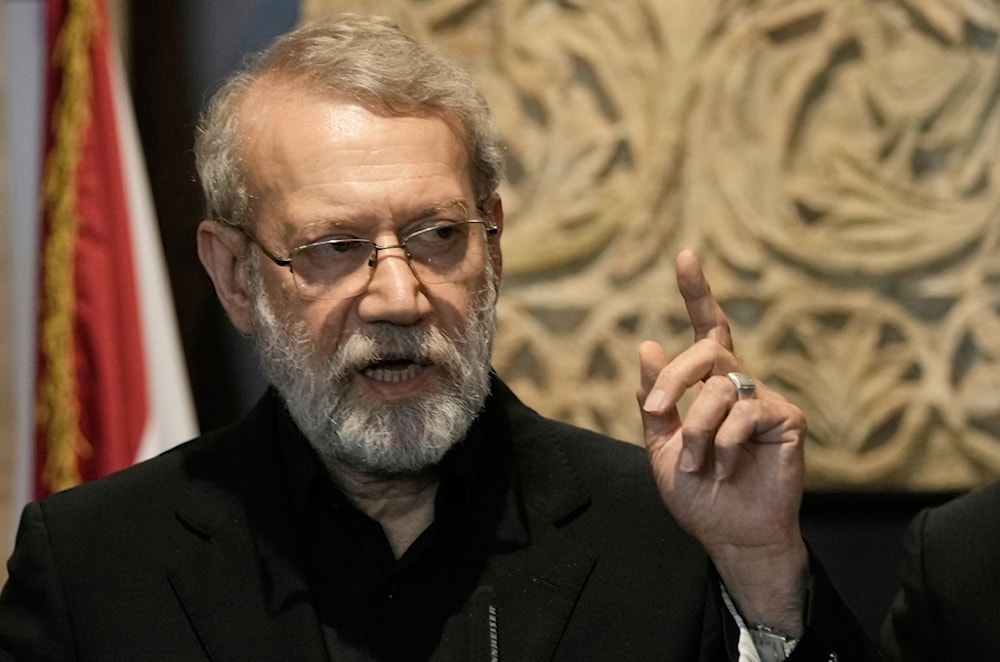Larijani: If they want war, so be it; Iran will not surrender
Iran’s top security official Ali Larijani stressed that Tehran will not bow to pressure, warning that negotiations are only possible if the other side recognizes the futility of war.
-

Iranian Secretary of Supreme National Security Council Ali Larijani, speaks during a press conference after his meeting with the Lebanese parliament speaker Nabih Berri, in Beirut, Lebanon, on August 13, 2025. (AP)
Secretary of Iran’s Supreme National Security Council, Ali Larijani, dismissed claims that Tehran could be forced into submission, calling such talk “nonsense.”
He stressed that the Iranian people had proven during the recent war that they would not surrender.
“Negotiations are fruitful only when the other side realizes that war is futile and seeks to solve problems through dialogue,” Larijani stated, while warning that using negotiations as a pretext for other goals does not constitute real talks. He underlined that Iran’s condition remains entering “serious negotiations.”
“If they want war, let them do as they wish,” he added. “When they return regretful, they can come back to the negotiation table.”
Read more: Iran showcases next-gen missiles in major war games
Security and nuclear file
Larijani also pointed to measures being taken to address vulnerabilities in Iran’s security domain, noting that special sessions have been held on the matter. He explained that breaches are not limited to human factors but also involve modern technologies, stressing that problems must be resolved without hesitation.
On the nuclear file, Larijani reiterated that Iran could always consider withdrawing from the Nuclear Non-Proliferation Treaty (NPT). He noted that such a move would require careful deliberation and wisdom, while reaffirming that “Iran does not seek to acquire a nuclear bomb.” He criticized the NPT for having provided no benefit to Iran.
While underlining Iran’s firm commitment to diplomacy, Larijani cautioned that diplomacy should not be turned into a stage for theatrics.
“The diplomacy they practice today aims to create pretexts,” he warned, though confirming that Iran “will never abandon diplomacy” as a tool.
Read more: UN, US in crisis talks after Iran froze IAEA nuclear inspections
Resistance has not weakened
Addressing regional dynamics, Larijani dismissed claims that the Resistance axis has weakened. “If they think Resistance is weak, why do they continue pressuring it so intensely? Pressure is applied to the strong, not the weak,” he said.
Turning to Gaza, he challenged Israeli claims of defeating Hamas.
“You killed and starved people, but failed to eliminate Hamas. That is proof of its resilience and resistance,” he declared.
Read more: Gaza Resistance targets Israeli troops, assets; casualties confirmed
Hezbollah, Iraq, and Yemen
Larijani further defended Hezbollah, recalling its origins during “Israel’s” occupation of Beirut.
“It is natural for any people to resist occupation — this is how the core of Hezbollah was formed,” he said. He added that while Iran provided support, “the essence of Hezbollah was created by the Lebanese people themselves.”
The same logic, he argued, applies to Iraq, where US occupation gave rise to Resistance movements as a natural response to injustice and “the foolish behavior of American soldiers.”
On Yemen, Larijani emphasized that the Ansar Allah movement had long existed, but Resistance solidified in response to US and Saudi-led aggression.
“It was the people’s will to defend themselves that gave rise to the Resistance movements everywhere,” he affirmed.
Read more: Larijani on Lebanon: Iran does not issue orders to Lebanon

 3 Min Read
3 Min Read








